“We’re a Little Scary and Powerful”: THR’s Actress Roundtable With Michelle Williams, Jennifer Lawrence, Michelle Yeoh and More
- Oops!Something went wrong.Please try again later.
- Oops!Something went wrong.Please try again later.
- Oops!Something went wrong.Please try again later.
- Oops!Something went wrong.Please try again later.
- Oops!Something went wrong.Please try again later.
- Oops!Something went wrong.Please try again later.
- Oops!Something went wrong.Please try again later.
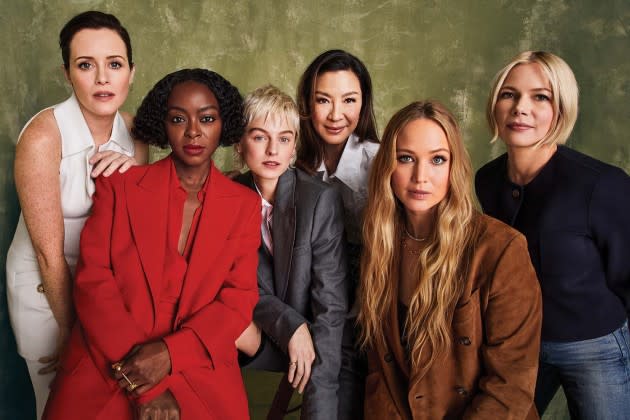
From how they’ve dealt with hearing no to how they’ve learned to say it themselves, the actresses who delivered some of this year’s most memorable performances are sharing their strategies for navigating a changing Hollywood — and a changing world. In November, Emma Corrin (Lady Chatterley’s Lover), Danielle Deadwyler (Till), Claire Foy (Women Talking), Jennifer Lawrence (Causeway), Michelle Williams (The Fabelmans) and Michelle Yeoh (Everything Everywhere All at Once) gathered in Los Angeles for this year’s annual THR Actress Roundtable.
What do you do when you really want a role? What is the furthest you’ll go?
More from The Hollywood Reporter
Michelle Yeoh Brings Oscar Home to Mother: Without My Parents, "I Wouldn't Be Here"
Michelle Williams Says There Are No Oscar Rivalries: "It Isn't What I Experience With My Peers"
EMMA CORRIN Write a letter. It’s never worked.
What did you say in it?
JENNIFER LAWRENCE “Please?”
CORRIN Yeah, pretty much. “Please.” Very deep and emotional. I’ve done that a couple of times.
LAWRENCE When Winter’s Bone turned me down, they were doing L.A. casting that I went to, and they were like, “No, thank you.” And then, they opened up casting in New York, and I flew to New York and just reentered like a stranger.
CLAIRE FOY They turned you down?
LAWRENCE Yeah. Maybe they were just scared at that point, and they were like, “OK.”
“She wants it.”
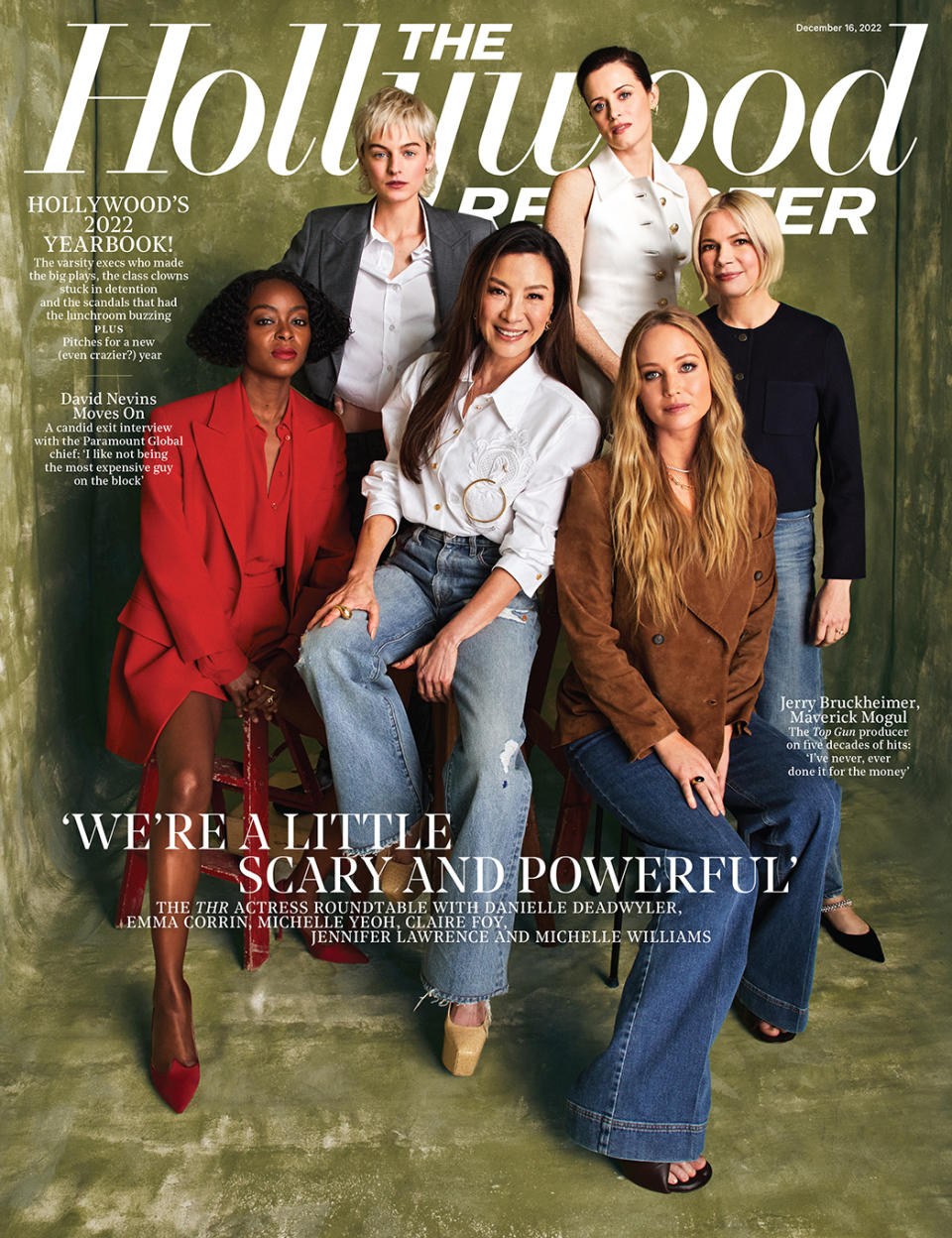
MICHELLE YEOH But isn’t it good that [we] want the role? Don’t you want someone who’s really passionate and will bring their full game rather than just casting an actress who’s like, “Oh, OK.”
CORRIN I don’t think there’s any harm in it. There’s probably a line somewhere.
LAWRENCE Don’t go to anyone’s house.
YEOH A lot of the times I get the script, and it’s not written for a woman like me. I remember doing Sunshine with Danny Boyle. It’s a story about the astronauts going to the sun, trying to save us. When I first received the script, it was written for a man to start off with, so that was already such a joy that Danny thought, “Well, I would change it for you.” Then, at that point, I said to him, “Why do you think at that time it’s still the Russians and the Americans going to space? Wouldn’t you have more Japanese, Chinese?” It takes a director with great confidence of who they are and their vision, and he changed it. We had Hiroyuki Sanada, Benedict Wong and myself. That’s the time when you think, “Can I make that bold step?” Because the next thing they’ll be like, “OK, bye. Thank you, but no thank you.”
MICHELLE WILLIAMS It’s also really nice to live in that passionate state. When you want something, when you’re so full of desire that it burns you to where you have to go outside of your comfort zone, and make yourself so incredibly vulnerable in front of a stranger, and say, “I want this with my whole heart. I’m in a flame right now for this thing, and I don’t know if it’s going to be expanded or extinguished.” I love being in a desirous state — before you consummate something and you get it. That’s the most exciting time, when you’re like, “This thing exists. Whether I get to touch it or not, it’s out there.”
Danielle, for Till you submitted an audition tape of a scene where Mamie Till-Mobley ties a necktie on her son, and for your audition tape, you were tying a necktie on your own son. What was that experience like?
DANIELLE DEADWYLER I’ve done a movie with my son before, and so he just lends me his skills here and there. That was easy. That was lighthearted. The other two scenes that I did were speeches, from the courtroom scene and the Harlem Rally speech. I’ve always auditioned for everything that I’ve ever had to do. It’s the intuitive spirit of “I will do this difficult, challenging audition, and then throw it away, and let it go, and it’ll come back in some other form if I don’t get it.”
Was there any part of you with Till that was like, “Whew, if I get this …”
DEADWYLER It was difficult to even get to do the audition for it — because I’m reading this very tension-filled, anxiety-ridden script, I had to go about it slowly. When I did finally finish it after a week, they were like, “Hey, Danielle, you want to go ahead?” OK, do it and just relinquish it because it was too much to continue to carry.
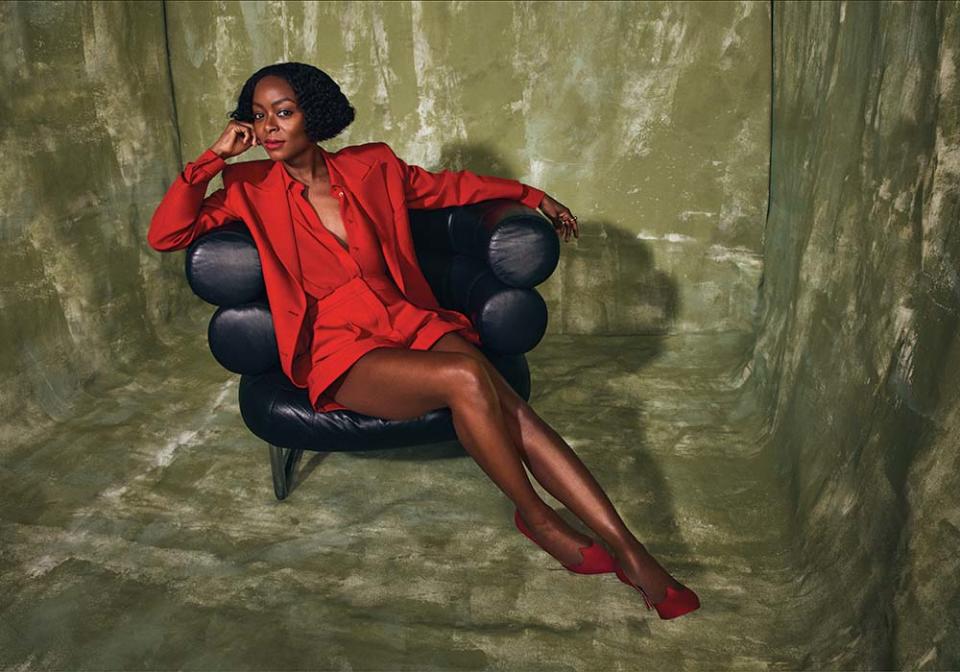
Claire, I had heard that Sarah Polley originally envisioned you for a different role in Women Talking than the one you ended up playing. Is that right?
FOY It was for a part that I would’ve tried very hard to act, but I would’ve really been acting it. In the meeting that we had on Zoom, she said, “Who do you like? Who’s your favorite character?” And it was Salome. I just really loved that she made the emotional weather in the room. She was allowed to be big, loud, angry, and nobody took it personally. I see all the time that if you are that way, if you are quite a lot as a person, people tend to want to squash it, or make it not quite so much for them to deal with. And the women in the room were capable of just letting her be who she was. I just loved being able to be big.
Once you have the role, and you’re starting to sink your teeth into it, what’s the first thing you do? Michelle, I remember you telling me that you have an iPad and that you put every piece of research you have about a character on that iPad.
WILLIAMS I’ve just done that with women that I’ve played who actually were [real people]. There’s so much material. Marilyn [Monroe, from My Week With Marilyn] was the first person. I was coming to set with this enormous, heavy bag every day that had all the books that had ever been about Marilyn. Somebody said, “Why don’t we compress this for you?” Trying to play somebody who had these beautiful, sloping shoulders, I thought, “Oh, that’s really helpful.” You have this touchstone that you go back to, and you can put in your [ear]pods, and listen to a thing. It’s a nice place to go in between takes. You have this homing device for this person.
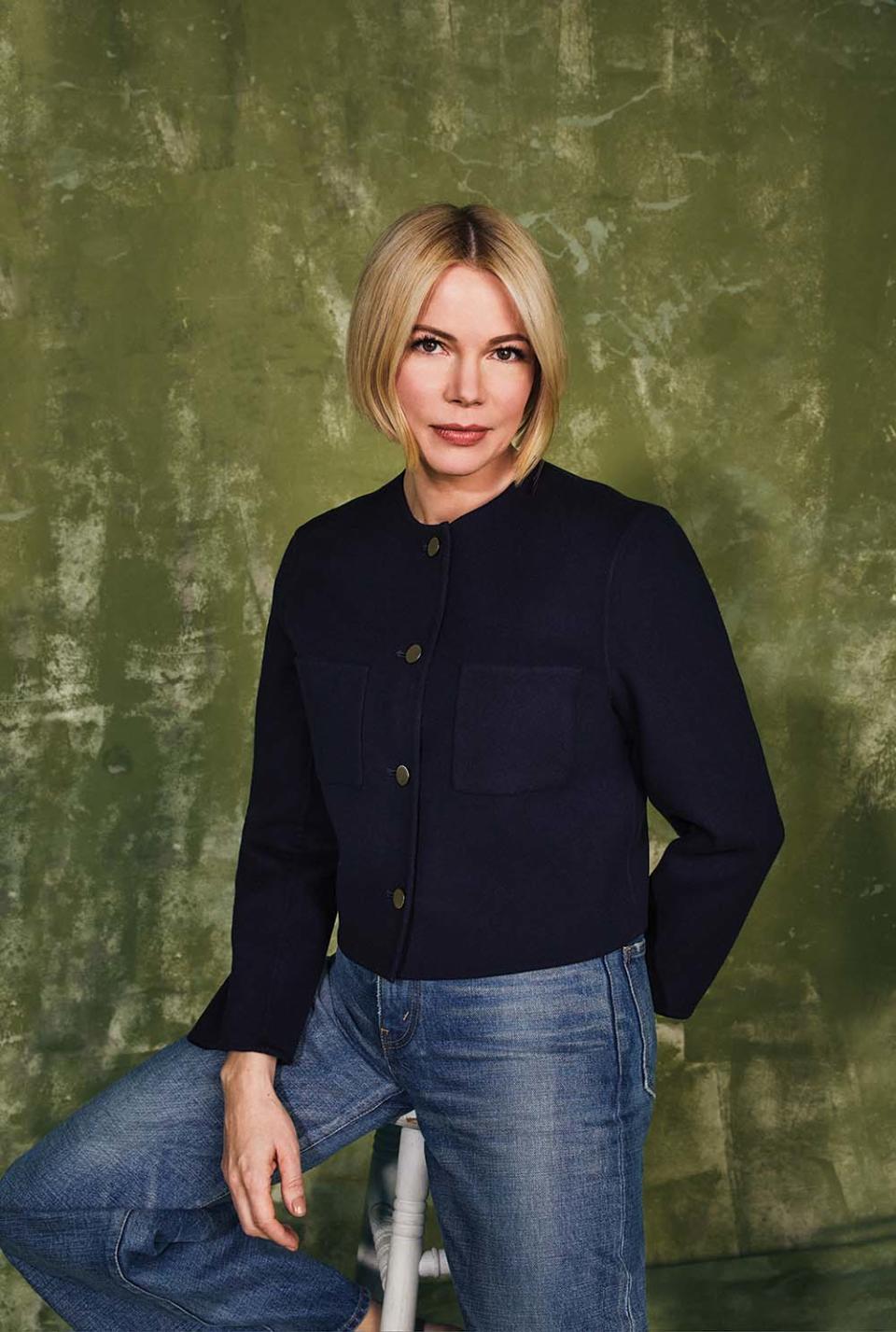
How much does it help once you’ve got your costume, or your props, once you can touch something?
DEADWYLER Mamie [Till-Mobley] is much more of a woman of a certain era, and I am a bit of a thug. The costuming, it just pulls you up erect. She’s already going through a particular kind of taut experience, a tightrope experience, but the dresses just make you elongate. And then, not to mention the societal and cultural rigor of the time. There’s a discipline to womanhood. There’s a discipline to beauty. So, yes, it definitely yanked me up in a certain way.
Michelle, in Everything Everywhere All at Once, you’re a million different characters. Are you just showing up on the day and looking at what’s hanging for you in your dressing room?
LAWRENCE Did you have a favorite?
YEOH The rock. The most difficult was, in the action movies, I’m generally the one who’s always in control, the mentor, the teacher. And in this one, obviously, Evelyn has no clue what she’s doing. She’s a failure in everything, which makes her so vulnerable and wonderful to play because she doesn’t give up. I go to this universe where I’m a kung fu master, and then I come back to this. And so, I’m doing all the moves, fighting with Jamie Lee Curtis, right? And that’s a lot of fun. Then the Daniels [directors Daniel Kwan and Daniel Scheinert] come up to me and say, “Michelle, you can’t look like you know what you’re doing.” I’m like, “What does that mean?” Then, “Yes, of course. Evelyn Wong doesn’t know.” It was completely out of my comfort zone. I was suddenly doing comedy, physical comedy, action, horror, every single genre all packed into one, and jumping in and out of it. It was such a gratifying experience. I’ve waited a long time to receive a script like that. Because, as you get older, the box gets smaller and smaller. And especially for us, it’s never been an easy ride to start off with. I honestly look at all of you with such envy because you get an opportunity to try all the different roles, but we only get that opportunity maybe once in a long, long time. Crouching Tiger was 22 years ago. With Crazy Rich Asians, suddenly, I am the mean mom. Then I was the auntie. Then when I receive a script and they say, “Please play the grandmother,” I was like, “Please don’t put me in that box.”
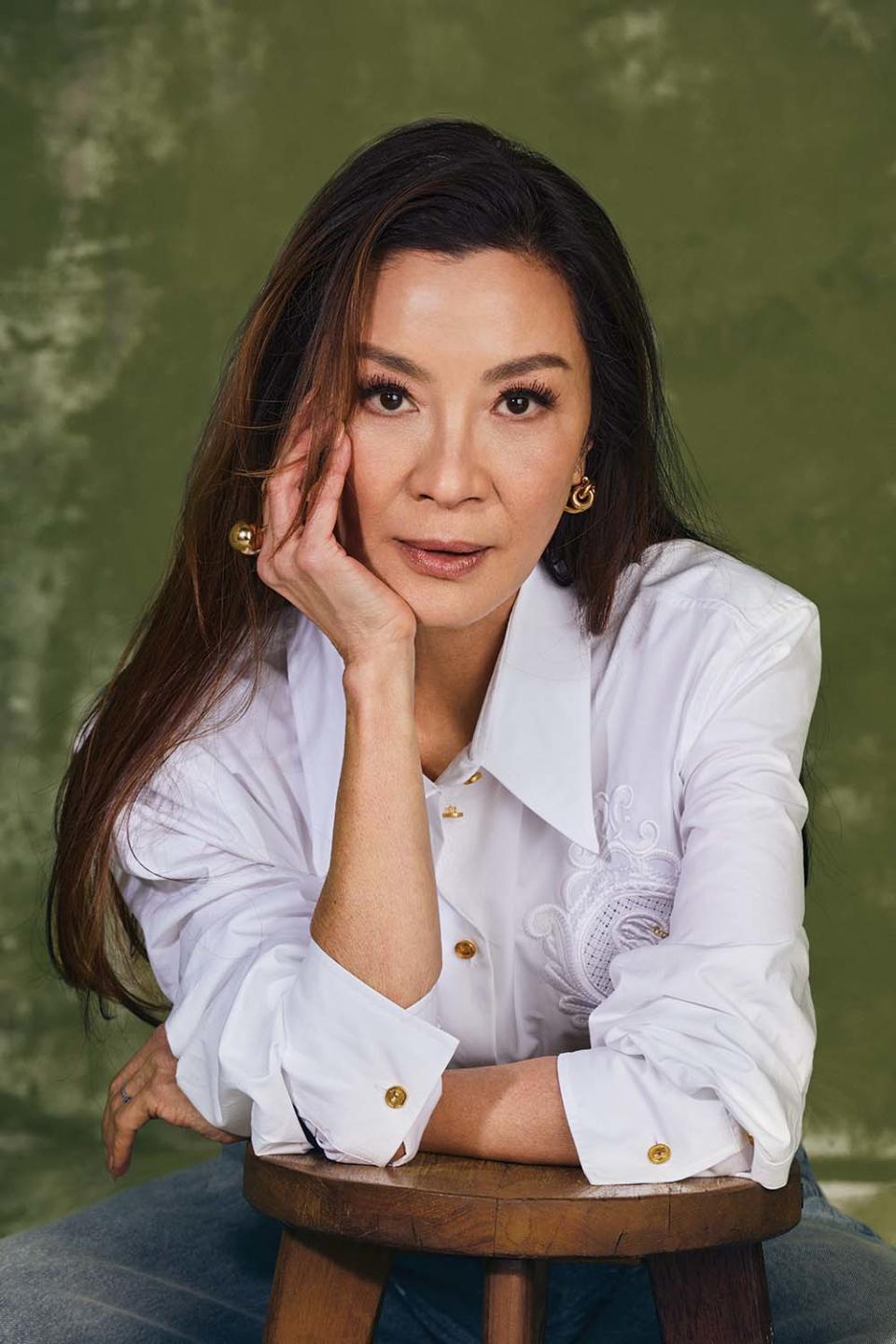
Does anyone else relate to being put in a box?
FOY When I first started acting, and I was doing lots of British TV, it’s just inevitable that everybody goes, “You’ve done that, so we’ll give you this.” I’m like, “But it’s almost identical.” Very often, it’s the things that you don’t do that navigate your career. It’s when you go, “No, I’m not going to do that because that’s not going to stretch me, or that’s not going to give me something that I need.” Sometimes it is worth making the decision that seems a bit strange, but you have to be given the opportunity to do that. And that doesn’t happen, and it hasn’t happened for so many people for so long.
Jennifer, you’ve said that you felt like your career choices had been hijacked by other people and that you had to really take the reins back for yourself.
LAWRENCE Yeah. I was at a really big agency, and I just feel like I had given away my agency. But it was also my fault. I would watch things and be such a fan. I would watch Uncut Gems, and be like, “Oh my God, the Safdies, that’d be so cool to work with them.” But I didn’t reach out, and that’s something I’ve gotten better about in the last few years. I also think a lot of it was just losing touch with the world a little bit. I was working so much, and so much of what we do has to do with observing people. I felt like I couldn’t really observe anyone because everybody was observing me. And so, taking a few years and getting back to life, I feel like I can be creative again in that sense.
![“I’ve seen emotional men. I’ve seen the biggest hissy fits thrown on set. Female director[s] are the calmest, best decisionmakers I’ve ever worked with,” says Lawrence of the perception of women helmers.](https://s.yimg.com/ny/api/res/1.2/xvF0BX4BMvsO1C6ewElG4Q--/YXBwaWQ9aGlnaGxhbmRlcjt3PTk2MDtoPTE0Mjc-/https://media.zenfs.com/en/the_hollywood_reporter_217/5a79f1a9e2ad7ed480ff7256206f90bf)
Has anybody else had that experience of feeling like a lot of people have a lot of opinions about what you should do, and it’s hard to make your own choices?
CORRIN Yeah, [it happens] when success happens very quickly, when you’re young, and you haven’t quite found the power in your own voice yet, in terms of what you want to do, what’s best for you and actually being able to advocate for what you need. That’s been something I’ve had to learn really fast. I’m very much a people pleaser generally in life, and that’s a wonderful thing in many respects. It can also be very, very harmful in this industry because it means you get taken advantage of very quickly. It’s really important not only in navigating career choices but also on set in terms of the hours you’re asked to work, the things you are meant to do, especially as women or nonbinary people, it can be really important to be able to know that you can say no, and draw a line, and that that’s not disrespectful. I always felt I had such imposter syndrome, or felt like I was so green, or so inexperienced that I had to take everything everyone else was saying as gospel, and it’s been a huge breakthrough very recently to learn to advocate for myself.
DEADWYLER See, when your body and your mind are pushed to a certain degree, and you understand your limit, you will resist, right? I was on a film, things were being asked of me, and I was expressing the need to not, and I was like, “How many times does a woman of color have to ask for something to go the way I need for it to go?” Why do women have to do that? Why do nonbinary people have to do that? It shouldn’t be about being pushed to a certain degree in order to articulate your need.
FOY Some people just can’t hear the no. I can’t tell you how many times I’ve said something so calmly to the point of I’m almost asleep, “No, I don’t want to do that,” and I get, “All right. Whoa, whoa, whoa, whoa, whoa.” I couldn’t be less aggressive. I noticed when I first started acting, I was like, “Ooh, this takes up a lot of time, and I’m expected to give a lot of my life over.” Even then, I was like, “I don’t think that’s actually OK.” What I’ve noticed is, I’ve just started to not think I have to do anyone a favor. I’m being employed to do a job. You’re paying me. I’m here. I’m committed. I want to do this. This is great. Because an industry’s creative, sometimes I think there is an idea that it doesn’t have to be professional. It should always be professional. There are boundaries, and they should be respected. And that’s why I think it’s OK to say, “We are going to work until 8 p.m., and then we stop. Yes, I know the day’s running long, but I have to go home, and I have a child. I have another life; today, I am not going to go over,” and it not to be seen that you are bringing the film down. This industry sometimes really does need limits.
DEADWYLER Each production is a system. You say, “I’ve got to go home. My child needs me. I’m doing this, period.” And then, they will adjust. The others will act crazy, but we have to force them to adjust.
LAWRENCE They’ll call you a crazy bitch.
CORRIN There’s a real fear of being thought of as a crazy bitch, or a diva, or you hear these horror stories of people being like, “Oh, yeah, I work with so and so,” and you’re like, “Oh God, I don’t want to be like that.”
WILLIAMS What I’m thinking about is how often actors are made to feel like children, and that we don’t get information. It’s kept away from us because they feel like they can’t trust us with the information, and it’s so frustrating. But it’s happening less and less in my experience. In the past few years, I really do feel a shift. I feel a difference after #MeToo. I just feel like there’s more information flowing between all of us. And we’re a little scary and powerful. I see more information coming to me, and people saying, “Now, based on the information, what decision do you want to make?” That we’re just being trusted more. Is that just me?
LAWRENCE No, it’s not. I’ve definitely felt a shift as well.
FOY Sarah Polley, the director of Women Talking, said that with this film, what she did was prioritize the experience as opposed to the outcome of what the movie was going to be, and so rarely that’s what happens. Often it’s: “Where are you trying to get to? Make something good.” As opposed to just trying to believe that what you’re doing in that precise moment is good. And the crew are happy, and everyone’s fed, and everyone’s had eight hours of sleep.
DEADWYLER Y’all did that?
FOY Yeah. She’s got three kids, so the hours were, “This is what we’re going to try and do. If we can’t do it, we’re going to talk to you about it.” My daughter was sick at the end of the movie, and I was by that point so homesick that she was like, “Just go. Just go. Just go.” I was pushed onto the airplane. That would never, ever happen.
CORRIN Have you read [Polley’s] book? She published Run Towards the Danger, and it’s so beautiful. It’s about experiences she’s had in her life with so many things, but one of them is her experiences acting as a child, before there was any kind of shift in the industry. You just feel like she’s learned so much through doing. Working with directors who’ve been actors themselves, there’s an understanding. It creates this ability for you to be able to articulate something. It’s relatable. Which makes such a huge difference.
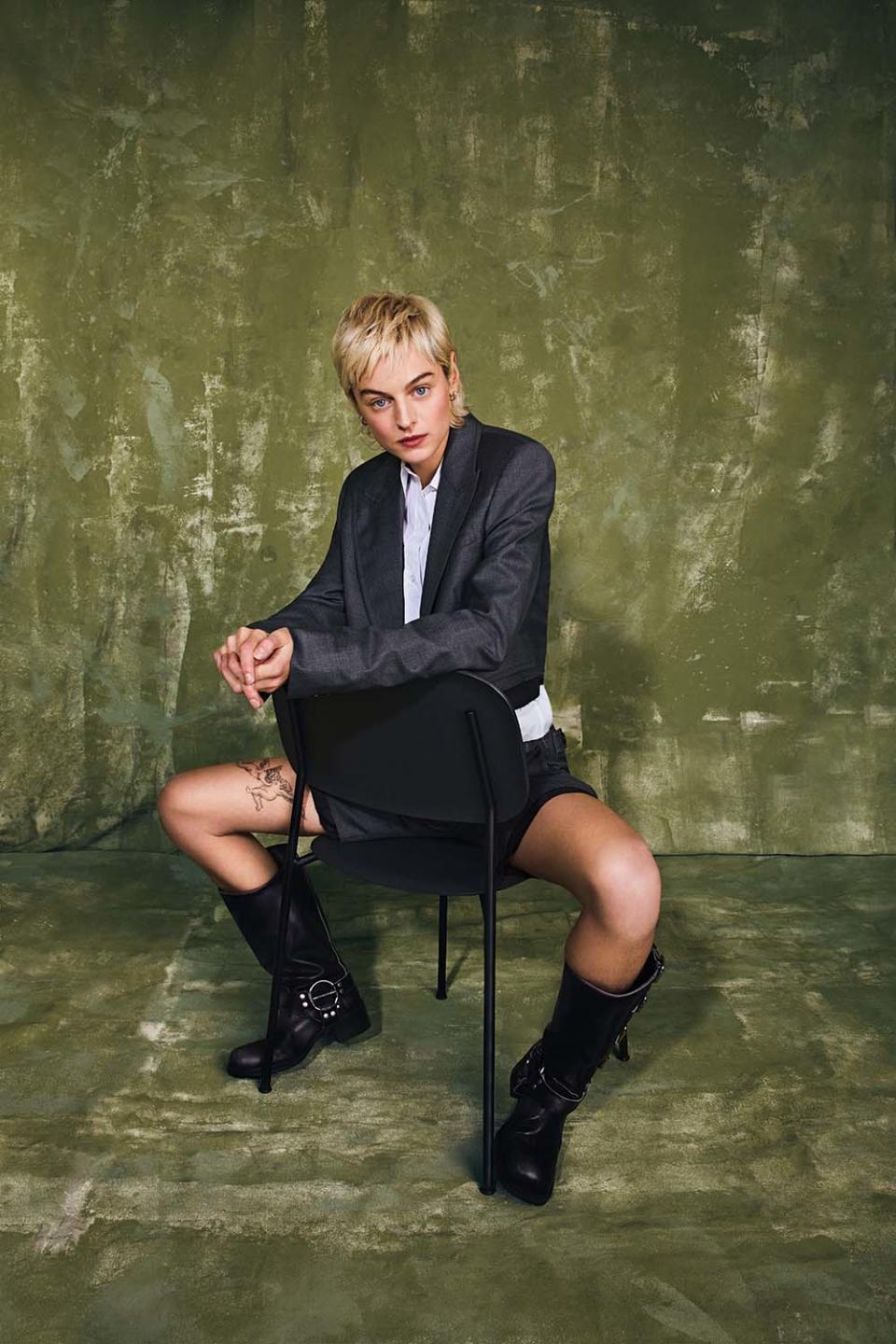
How did that show up on Lady Chatterley’s Lover? Your director, Laure de Clermont-Tonnerre, is also an actor.
CORRIN Because we were quite close in age, I just felt like I could talk to her about anything. Also, given the nature of what we were doing, so many sex scenes and so much nudity, Laure being a woman was incredibly comforting, and it felt very safe. I could really express my limits of comfort.
DEADWYLER There’s so much freedom in that damn movie. So much that you have to trust your director. I see that in every quality of how you’re moving through the film.
Is it silly that when we get to talking about acting in terms of awards that we divide it by gender? Should it just be best actor, period, and we don’t have a table for each?
YEOH No. Then there’s more for everyone.
FOY It’s silly, isn’t it? Because, is there a best? I mean, I probably shouldn’t say this, but is there a best actor?
CORRIN You mean the gender-specific part. I think that there needs to be a change so that people who are nonbinary feel included and represented. It’s about feeling acknowledged and seen. But there are a lot of things to be worked out before then. It also comes down to there being roles for queer people. There are more and more, but there aren’t enough yet. The work has to come from the bottom up. I get asked this a lot in terms of being nonbinary but playing female characters, and where I feel comfortable in being considered for awards. And I don’t really know. How much does the award have to do with you, and your gender, or the gender of the person who you play? Connie [in Lady Chatterley’s Lover] is female. In general, these conversations are about including people and feeling like anyone can identify however they want and still be acknowledged.
How abortion is portrayed onscreen tends to look very different from how it looks in real life. Is there a responsibility for TV and movies to adjust?
CORRIN Never Rarely Sometimes Always did it the best that I’ve seen onscreen. Eliza Hittman did this film about a girl who needs an abortion, but she can’t get one in her state. So, she does a road trip with her best friend to get one. It’s absolutely incredible — it really captures the mundanity and the bureaucracy. None of it’s romanticized or altered to work onscreen; it’s just very truthful.
DEADWYLER It’s critical. We’re in that moment now where each state has a different dynamic going on. Got to travel to this state, this state can’t do it. All of those stories have to be events so that people understand how stupid it is to try to hinder women’s choice.
LAWRENCE Georgia has counties without OB-GYNs. People have to drive across state hundreds of miles just to get a pap smear, to get medical care, because the attack is on femininity. D&Cs are just as much a medical procedure. I had one when I had a miscarriage. If I didn’t get a D&C, I could’ve gotten an infection, I could’ve died. I think back to the way it’s portrayed in films. Any time an abortion is portrayed as killing babies is not helpful, that imagery. Women everywhere need voters to understand that abortion is health care.
FOY I’m going to steal from Sarah Polley again because she’s a genius …
LAWRENCE Because you’re obsessed with her.
FOY (Laughs.) I’m obsessed with her. She’s my favorite person. But obviously, our film is about sexual abuse and rape of children and grown women. What I think that she articulates really beautifully is that a lot of these experiences, whether it’s childbirth, rape, abortion, are fetishized by moviemakers. It might help a lot of people to understand that it’s human beings who are going through these things. You have to look at who’s making the movie, why they’re making it, why they’re choosing to put that scene in it and why are they choosing that frame of reference to portray it? Are they fetishizing it and using it because it’s gratuitous? What does it say? We have to ask ourselves so many questions. We’ve got such responsibility for making sure that it’s not just because it looks good on film.
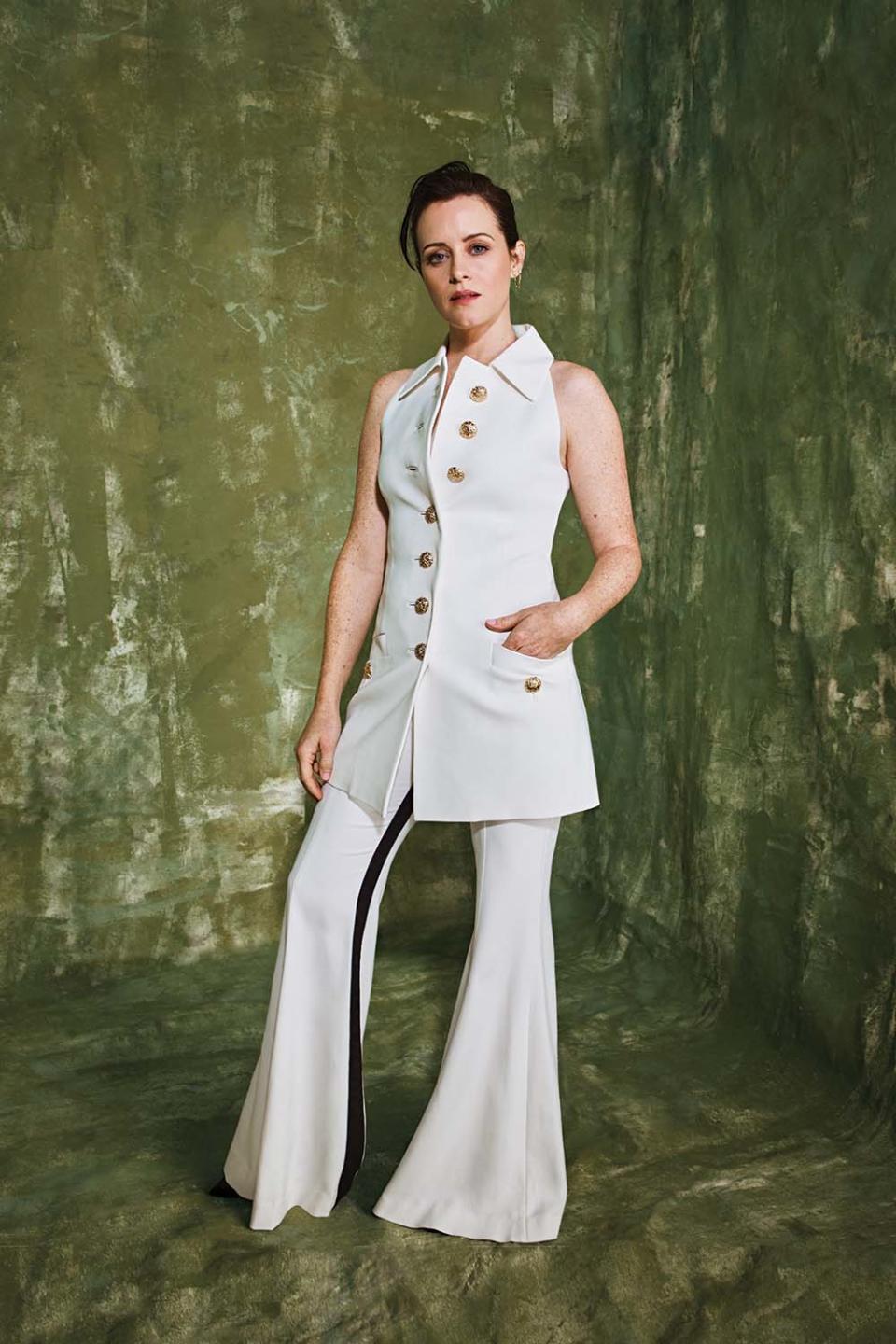
Jen, Danielle and Claire, each of your movies has a character who’s recovering from trauma, but the movie doesn’t show the trauma. The rapes in Women Talking, the beating in Till, the war injury in Causeway aren’t shown. It’s such an interesting choice, and pretty counterintuitive. Was that something that you and your filmmakers talked about?
DEADWYLER We definitely did. It was intentional to not show any violence. We all know that violence. We’ve seen that violence. There are plenty of black-and-white images that galvanized us, of the civil rights movement. It was about the point of view of Mamie. She wouldn’t have witnessed that. And it was also to not retraumatize the filmmakers, the audience. This was about the arc of someone who comes into an understanding of their power in a certain way.
LAWRENCE Interesting it’s three female directors, too.
Is it easier to get a film with a female director made now than it used to be? Jen, you produced Causeway. What was your experience?
LAWRENCE It was making me laugh when we were talking about the hours and stuff because it was just so interesting to be on a female-led movie. My producing partner and I were the lead producers. We had a female director [Lila Neugebauer]. The schedule made sense. There were no huge fights. If an actor had a personal thing and wanted to leave early, instead of going, “Oh! Well, we’d all love to leave early!” we’d put our heads together and go, “OK. How can we figure this out?” We disagreed, and we listened to each other. Sometimes I was wrong and would learn that I was wrong, and sometimes I was right. It was incredible to not be around toxic masculinity. To get a little break from it. And it did always just make us laugh about how we ended up with, “Women shouldn’t be in roles like this because we’re so emotional.” I mean, I’ve worked with Bryan Singer. I’ve seen emotional men. I’ve seen the biggest hissy fits thrown on set. [Neugebauer’s] my third female director, and they are the calmest, best decision-makers I’ve ever worked with. I absolutely love working with female directors. But, yes, it’s getting easier.
WILLIAMS I feel like I’m stuck 10 minutes ago trying to figure out how and if you can portray violence and rape without it being fetishized. I’ve thought so much about it because you so often see it in scripts. You can’t trust that it isn’t going to be fetishized when you put it into the wrong person’s hands. I’m so moved to hear that this is happening, that you can concentrate on the women and what their experience is. There’s just so much change at this table. It’s just incredibly moving.
What’s the best way to decompress after shooting something really intense?
FOY Margaritas.
DEADWYLER Martinis.
WILLIAMS Sticking your head out of the car window like a dog.
LAWRENCE Post-wig, that would just feel great. I love my reality TV. Love Island.
CORRIN Below Deck is great.
LAWRENCE I just finished all the Below Decks. I had COVID, so I’m caught up.
What is it about reality TV that helps you?
LAWRENCE May I try to defend myself? I had to defend myself to Woody Harrelson. He came into my trailer and was like, “Are you really going to watch this garbage?” And here’s what I have to say about the garbage: You’re watching interpersonal relationships that are real. As far as I can see, they’re real. I’ve never made a reality TV show, so it’s real, it’s real, it’s real.
DEADWYLER Research.
LAWRENCE I’m watching this fascinating dynamic, there’s the narcissist that clearly has borderline [personality disorder]. I love diagnosing people with borderline on reality TV. So anyway, I’m studying, and I’m a hero. That’s all I have to say about it. You guys [in the U.K.] have the best reality show ever: Don’t Tell the Bride. The groom plans the entire wedding, and the bride can’t know about it. And sometimes it’s great and romantic and like, “Oh, these colors are horrible, but thank you, honey.” And then sometimes, they break up over it. One woman was like, “Not Vegas. Not Vegas. Not Vegas.” Guess what? It was Vegas. And he didn’t invite her sister. Borderline!
Interview edited for length and clarity.
This story first appeared in the Dec. 16 issue of The Hollywood Reporter magazine. Click here to subscribe.
Best of The Hollywood Reporter
'The Super Mario Bros. Movie': See Who Voices the Beloved Characters
Hollywood Reporter Critics Pick the 50 Best Films of the 21st Century (So Far)
Hollywood Flashback: 'Soylent Green' Depicted an Overpopulated Planet With a Dark Secret

